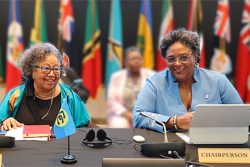Teachers of schools across the Deep South Rupununi have written to the Ministry of Local Govern-ment saying that they cannot comply with a directive that they open bank accounts in order to receive their salary citing the distance, time and cost it would take to travel the 200 km to the bank in Lethem.
In the letter stating their resistance to the proposal, Stabroek News was told, the teachers outlined several reasons including distance, time and the cost of travelling to Lethem. Teachers have previously pointed out the distance from the Deep South communities to Lethem with Shea being 139 km away and Achiwuib being 233 km away from the Region Nine capital. The only banks in the sprawling region are in Lethem. The cost of transport is also high and rises in the rainy season. In addition, the journey to and from Lethem typically takes more than a day. One teacher told Stabroek News yesterday that very few had established bank accounts. “They cannot afford it,” the teacher said.
The local branch of the Guyana Teachers Union (GTU) met last week and prepared the letter outlining their concerns, the teacher who spoke on the condition of anonymity for fear of victimization, said. The letter was to be sent to the Ministry of Local Government and copied to the Ministries of Education and Amerindian Affairs, among other agencies. The teachers also made several recommendations. The teacher said that the public servants are now waiting to see what will happen.
Other public servants and pensioners were also required to open accounts but they too have said that while they have no problem with the idea, the issue of time, distance and cost would have to be looked at.
Region Nine Chairman Wilson Laurentino told Stabroek News yesterday that he had learnt of the issue from reading it in the newspapers and did not know from where the directive originated. He said that regional officials are discussing the matter.
The chairman said that he believes that the issue has good and bad sides and everyone today should have a bank account. He said that it is dangerous to have money around and recalled an incident in Lethem where a security guard died during a robbery. He said that there is the need for a discussion on the matter.
Teachers and other public service workers had voiced their frustration to Stabroek News last week. Several workers at Aishalton told Stabroek News that on March 21 when they went to uplift their salaries, they had to sign a circular signed by Regional Executive Offi-cer Claire Singh which said that it was the final instruction that they must set up a bank account by April 21 to receive their salaries.
They were required to sign the document before they could uplift their money. “They said we had to sign the letter before we collect our salary and of course we needed our salary so we signed the circular,” one woman had recounted. Workers at Aishalton said that it was the first time they had seen the circular. They, along with teachers from other communities were upset at the new requirement because of the expense and time it would take to travel to Lethem to uplift their money. They said that from Aishalton, a seat on a vehicle is $10,000 return during the dry season while to hire a motorcycle costs about $30,000. Vehicles do not travel regularly on the trail and the cost rises during the rainy season, the teachers said.
It was pointed out that in the health care sector, some workers earn as little as $35,000 and when transport costs are taken into account, it would represent about 1/3 of their salary. In addition, they would have to cater for accommodation and meals. “It would be hard for us to go to withdraw our salary from Lethem,” one woman lamented.
The villages in the Deep South Rupununi: Shea, Maruranau, Awaruwaunau, Aishalton, Karaudarnawa and Achiwuib are 139, 147, 161, 193, 213 and 233 km from Lethem respectively. Parabara which also has a school is 247 km away from Lethem where the only banks in Region Nine are based. Ordinarily, salaries are taken to Aishalton and then headmasters and health workers travel to that community to uplift the salaries for their respective schools and health centres.









